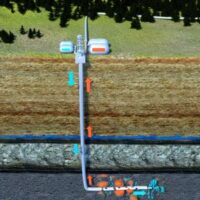Injuries Caused by Oil-Field Water Pollution

Air and soil pollution aren’t the only issues that can affect the health of oil-field workers. Water pollution, for instance, is also a very real risk, not only for those who work on oil-field sites, but also for those who live nearby.
Hydraulic Fracturing
Like air and soil pollution, oil-field water pollution can be a consequence of oil drilling, specifically hydraulic fracturing, or fracking. This is a practice in which chemicals, water, and sand are injected into deep rock formations, causing it to crack and release oil or natural gas. While effective, fracking has a lot of downsides, one of which is water pollution. This can occur when the chemicals used in fracking end up in stormwater runoff from drilling sites and are then carried into nearby rivers and streams. Eventually, these toxic chemicals can enter the drinking water supply, posing a risk to anyone who ingests it.
Waste Pits
Chemical runoff from the oil drilling process isn’t the only way that water can be contaminated near oil-fields. Drilling and producing oil creates a lot of liquid and solid waste that often ends up being stored in pits. Unfortunately, this waste is often hazardous and can easily contaminate not only the water on the surface, but the groundwater as well. If left on site, solid wastes can leach into the soil, contaminating groundwater, while liquid wastes can:
- Soak directly into the ground, contaminating the soil and water;
- Overflow the sides of the pit during heavy storms or as a result of inadequate construction, polluting surface waters; and
- Seep into the ground through tears in the liner, allowing chemicals to soak into the groundwater.
Coming into contact with contaminated ground or surface water can cause a lot of health problems, including certain types of cancers.
Stormwater Runoff
Finally, sediment and dangerous chemicals are introduced into rivers and streams via stormwater runoff. This occurs when the rain runs off of oil-field sites, equipment, and storage facilities and in the process, transfers oil, chemicals, and other pollutants through storm drains and ditches to lakes, rivers, and the ocean. Eventually, these contaminants can enter the drinking supply, posing a risk to anyone who ingests it.
Oil-Field Water Pollution is Dangerous
Water that has been contaminated due to oil-field activity is extremely dangerous, exposing those who ingest or come into contact with it to bacteria, viruses, parasites, and toxic chemicals. Potential health problems include gastrointestinal illnesses and infections, as well as liver, kidney, and intestinal damage. Others may experience problems with their nervous or reproductive systems and some cancers have even been linked to oil-field water pollution. The oil-field industry is required to take steps to help prevent these kinds of problems. Unfortunately, many companies fail to do so, which can have devastating consequences for unsuspecting victims.
Reach Out to Us By Phone or Online Message
If you or a loved one are experiencing health problems because of oil-field pollution, you should speak with an experienced Tulsa oil-field pollution lawyer about your legal options right away. Call Levinson Law, P.C. at 918-492-4433 to learn more about how our legal team can help.
Sources:
epa.gov/npdes/oil-and-gas-stormwater-permitting
ncbi.nlm.nih.gov/pmc/articles/PMC6765961/

